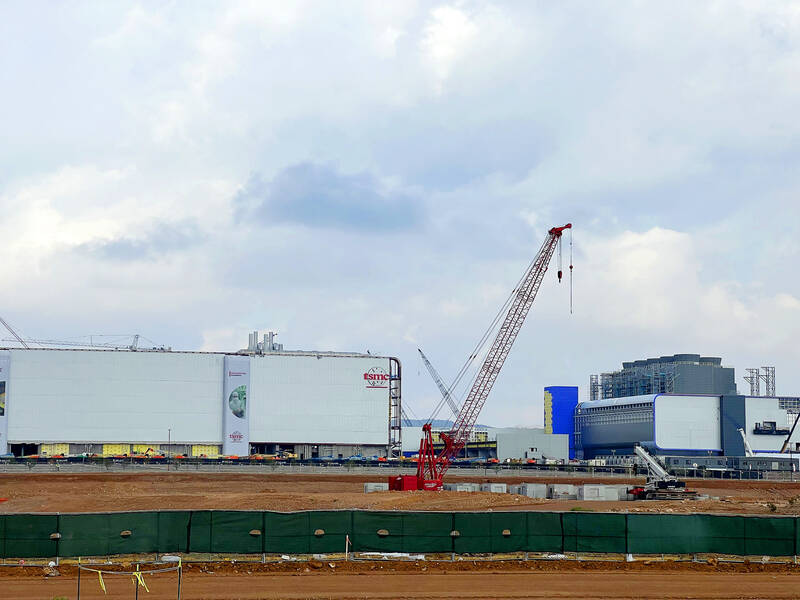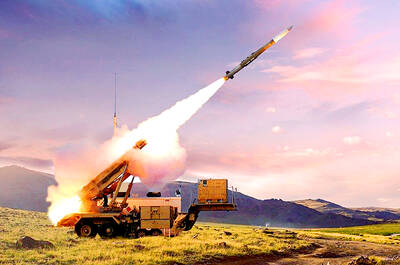Taiwan Semiconductor Manufacturing Co (TSMC, 台積電) yesterday said it is more than tripling its US investment to total US$40 billion as it plans to make 3-nanometer chips in 2026 at a second Arizona fab, adding to the chipmaker’s original plan of building a US$12 billion fab to make 5-nanometer chips in 2024.
The investment would mark the largest foreign direct investment in Arizona’s history and one of the largest foreign direct investments in the history of the US, the world’s largest contract chipmaker said in a statement yesterday.
In addition to the more than 10,000 construction workers at the site, TSMC’s two fabs are expected to create an additional 10,000 high-paying high-tech jobs, including 4,500 direct TSMC jobs, it said.

Photo: CNA
When complete, the two fabs would produce more than 600,000 wafers per year, with estimated end-product value of more than US$40 billion, the statement said.
“When complete, TSMC Arizona will be the greenest semiconductor manufacturing facility in the United States producing the most advanced semiconductor process technology in the country, enabling next-generation high-performance and low-power computing products for years to come,” TSMC chairman Mark Liu (劉德音) said in the statement.
US President Joe Biden was yesterday to visit the Arizona plant. The chipmaker’s investment is a big win for Biden after supply-chain issues disrupted the US economy early in his presidency.
Joining Biden on his visit to promote efforts to boost US technology manufacturing were expected to be Apple Inc chief executive Tim Cook, TSMC founder Morris Chang (張忠謀), Micron Technology chief executive Sanjay Mehrotra and Nvidia founder and chief executive Jensen Huang (黃仁勳), among others, the White House said.
They were to attend a “tool-in” ceremony, which is the symbolic moving of the first equipment onto the shop floor of the new US$12 billion facility.
The plant is scheduled to be operational in 2024.
“Bringing TSMC’s investment to the United States is a masterstroke and a game-changing development for the industry,” Huang said in remarks prepared for yesterday’s event.
US semiconductor production now accounts for just 12 percent of the global total, down from 37 percent two decades ago, a White House report on supply-chain problems last year said.
Taiwan’s dominant position as a maker of chips used in technology from mobile phones and vehicles to fighter jets has sparked concerns of over-reliance on the nation, especially as China ramps up its military pressure.
“The occasion for the president’s travel is to mark a significant milestone that TSMC is reaching in bringing the most advanced semiconductor manufacturing back to the US,” US National Economic Council Director Brian Deese said.

OPTIMISTIC: The DGBAS sharply upgraded its GDP growth estimate from 3.54 percent to 7.71 percent after the Taiwan-US trade agreement signing and given AI optimism The US imported more from Taiwan than China for the first time in decades, as US President Donald Trump’s tariffs reshape trade flows while a global boom in artificial intelligence (AI) fuels demand for tech products. US purchases of goods from China plunged almost 44 percent in December last year from 2024 to US$21.1 billion, US Department of Commerce data showed on Thursday. By contrast, shipments from Taiwan more than doubled during the same period to US$24.7 billion. The soaring Taiwanese shipments to the US reflect the huge expansion in supplies of chips and servers for AI companies, which has completely changed

NON-NEGOTIABLE: The US president’s action ran counter to one of the US’ ‘six assurances’ on not consulting China about arms sales to Taiwan, US lawmakers said US President Donald Trump’s admission that he is discussing arms sales to Taiwan with Chinese President Xi Jinping (習近平) is “alarming and a blatant violation of US policy and the six assurances,” US Representative Ro Khanna said on Tuesday. Trump on Monday said he would decide soon on whether to send more weapons to Taiwan, after Xi warned him not to do so. “I’m talking to him about it. We had a good conversation, and we’ll make a determination pretty soon,” Trump told reporters aboard Air Force One when asked about warnings raised by Beijing during a phone call with Xi over

US and Chinese fighter jets briefly faced off above waters near the Korean Peninsula this week, Yonhap News agency reported, marking a rare confrontation in that area between the two superpowers. About 10 US fighter jets on Wednesday departed an airbase in Pyeongtaek, South Korea, for drills above international waters off South Korea’s western coast, the news outlet cited unidentified military sources as saying. While the US planes did not enter China’s air defense identification zone, Beijing scrambled planes as they neared that region, the report said. “The Chinese People’s Liberation Army organized naval and air forces to monitor and effectively respond

VACILLATING? Some US officials are concerned that Trump’s April visit to Beijing might be affected if Washington pushes through additional weapons sales to Taiwan A major US arms sales package for Taiwan is in limbo following pressure from Chinese President Xi Jinping (習近平) and concerns among some US officials that greenlighting the deal would derail US President Donald Trump’s upcoming visit to Bejing, the Wall Street Journal (WSJ) reported on Wednesday. Trump on Monday said that he would decide soon on whether to send more weapons to Taiwan, after Xi warned him not to do so. “I’m talking to him about it. We had a good conversation, and we’ll make a determination pretty soon,” Trump told reporters aboard Air Force One when asked about warnings raised